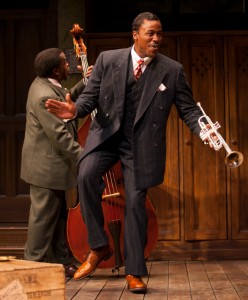
“The key is understanding my character’s humanity—his relationships, faults, feelings, choices,” Jason Bowen starts. A stage actor, Jason depends on his ability to engage hundreds of people, radiate energy, and elicit buy-in from the start. “I need to recognize my character and also understand what other characters think of him, are saying about him—how he affects what’s unfolding, even when he’s not onstage. Attaching real emotions to the words—that’s how you make a character come alive.”
Acting ability might have been in Jason’s DNA, but a future of performing some of theater’s most treasured and complex characters was not always an obvious choice. While Jason wasn’t a stranger to the stage in high school—he played flute in the orchestra, frequently sang at his church—basketball was his primary focus. “Sports and theater didn’t intertwine much at Milton in my years,” he says.
Then, in Jason’s Class II year, a friend urged him to audition for Milton’s production of Damn Yankees. He was cast in the pivotal role of Joe Hardy. That first taste of applause hooked him. The enthusiasm of his theater audience, along with sage advice and support from Debbie Simon (Performing Arts), seeded the idea that he might have talent, and set his life on a new course.
Jason performs regularly with Boston’s Huntington Theatre Company today, in productions such as A Civil War Christmas, Ruined, Prelude to a Kiss, and A Raisin in the Sun. He has been in residence with the Actors’ Shakespeare Project for nearly a decade, performing in Twelfth Night, The Duchess of Malfi and The Tempest, as well as A Midsummer Night’s Dream and Love’s Labour’s Lost.
During the production of A Soldier’s Play in his senior year at Milton, Jason was first struck by theater’s power as “an influential medium that can teach and have a meaningful impact,” he says. His favorite plays have taken on sophisticated substance and complex ideas. In college he directed Amiri Baraka’s Dutchman. In 2012, he earned a Best of Boston acting award for his portrayal of Levee in August Wilson’s Ma Rainey’s Black Bottom. One critic claims that Jason’s “roiling, titanic performance” of Rainey’s trumpeter “stole the show.”
“I learn more by experience than in the classroom,” he says, explaining why he had flirted with the idea of leaving college to pursue acting full time. In the end, he says, he accepted the counsel of a director friend and completed his degree in theater at Skidmore. After graduation, he hit the audition circuit in Boston and Providence.
Jason performed in his first Shakespearean play during his sophomore year in college and realized he had a knack for it. “Once I started to understand how to use the language, it began to come naturally,” he says. Out of school, Jason’s first play was Othello, under the direction of Ricardo Pitts-Wiley.
“There are fewer people of color doing classical theater of that magnitude, so I enjoy adding my own personal story, my own dimension to the roles,” says Jason. “I like taking the mystery out of Shakespeare. Shakespearean theater can be an elitist art form, because people feel they have to regard it in a certain way. Really, it’s just another script; you can take it wherever you want.
“Shakespeare’s ability to capture the human condition is, to me, why he’s lasted so long. Granted, the poetry is beautiful, but the magic is the combination of the language and his ability to tap into people. That’s one thing that doesn’t change over time. Technology changes, the world changes, but people—their feelings, their emotions, their relationships—remain the same.”
Part of the allure of the Actors’ Shakespeare Project is its itinerant identity; the company moves from place to place, transforming unlikely spaces and creating moving productions. Education outreach is also part of the model: Establishing residencies in public schools without arts funding, Jason and fellow actors develop projects with young people, empowering them to create and take ownership of the work.
Though in love with the art of theater, Jason admits that the lifestyle is a challenge. “They don’t teach you that in Acting 101,” he laughs. “You always hear about the ‘starving artist,’ but even when you’re not necessarily starving, it’s always a grind, always a hustle.”
He’s never been bothered by the unpredictability of life as an actor. It keeps the mundane at bay, Jason feels, and he’s always confident something is coming his way. “Wondering about my next role is exciting. Is it going to bring me to the next stratosphere? Just keep me even-keeled? Am I going to meet someone cool in the cast?”
Now in his early 30s, Jason is ready for more financial and geographic stability. When he started in this line of work, he had acting in film or on television in mind, and he’s moving on that goal with recent recurring roles in Law & Order: SVU. Film success can be lucrative, but it also means traveling, working on location. Jason hopes to score the trifecta: a television role based on an interesting character, predictable income, and the ability to raise a family in one place.
Shifting from stage to television is simpler than the reverse, he explains. “When you play to 600 people in a theater, you play to every direction. You have to project your voice, your emotion—you have to play big. With the camera, you just have to make sure they see your face. It’s easier to dial it down. The emotions are the same, but on camera you can just respond honestly. In theater, you also have to get it right every time. There’s no editing. You are entirely exposed and responsible.”
Jason credits his success to perseverance, self-confidence, a strong work ethic, and simply being a good, positive person. “In acting, so much negativity comes your way, directly or indirectly,” he says. “You have to be based in reality: know your strengths, and be willing to adjust your goals accordingly. No one is going to hand it to you, no matter how good you are. That doesn’t mean ditching your dream, but sometimes it does mean shifting it a little.
“Everyone has a set of values along with a list of things they’re willing to give up to attain success. Those convictions are going to be different for different people, but you should never feel like you have to jeopardize your morality. I’ve turned down auditions for that reason. It just means that particular part isn’t for you, but you’ll find another path. You don’t have to lose yourself to do this.”
by Erin Berg





